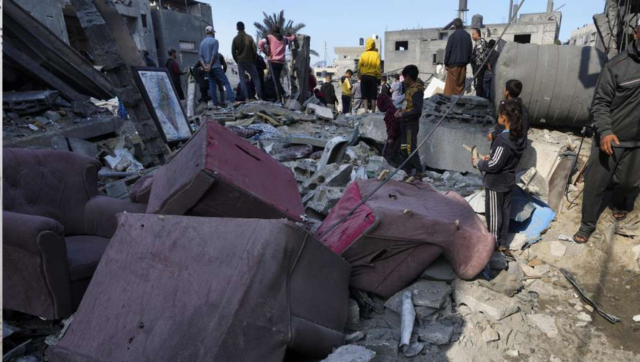Two issues that are significant to the United States have impeded the Security Council’s adoption of a new UN resolution aimed at accelerating much-needed aid to Gaza: mentioning a cessation of hostilities and assigning the UN the responsibility of vetting trucks to make sure they are truly transporting humanitarian supplies. The Arab-sponsored resolution was initially scheduled for a Monday vote, but it was rescheduled for Wednesday as council members continued their intensive discussions to avert yet another US veto. “We’re still working through the modalities of the resolution,” US National Security Council spokesperson John Kirby said Tuesday afternoon when the vote was still set for 5 p.m. “It’s important for us that the rest of the world understand what’s at stake here and what Hamas did on the 7th of October and how Israel has a right to defend itself against those threats.” It was postponed till Wednesday morning, following an open council briefing and confidential consultations on the UN political mission in Afghanistan, at the US’s request for extra time. An “urgent and sustainable cessation of hostilities” was demanded in the original resolution that was on the table Monday morning, but this wording was softened in a revised text that was distributed early on Tuesday. Now, it “calls for urgent steps towards a sustainable cessation of hostilities, as well as for the urgent suspension of hostilities to allow safe and unhindered humanitarian access.” In the past, the US has rejected language referring to a suspension of hostilities, and diplomats, speaking anonymously due to private conversations, stated that this is still a problem for the US. Additionally, the resolution requests that UN Secretary-General Antonio Guterres set up a system to oversee the delivery of aid to Gaza. The fact that this circumvents the current Israeli monitoring of aid entering the zone, according to the diplomats, is also a problem. On December 8, the US vetoed a Security Council resolution that called for an urgent humanitarian cease-fire in Gaza and was supported by dozens of other countries in addition to practically all other council members. On December 12, the 193-member General Assembly passed a similar resolution by a vote of 153–10, with 23 abstentions. The Security Council passed a resolution on November 15 in its first coordinated action, with the US abstaining, urging “urgent and extended humanitarian pauses” in the combat, unrestricted assistance delivery to civilians, and the unconditional release of hostages by Hamas. The resolutions that have been accepted, as well as the most recent one that is currently before the council, do not include the condemnation of Hamas’ October 7 surprise attacks into southern Israel and the endorsement of Israel’s right to self-defense, which the United States has consistently advocated for. At a session with ambassadors on Tuesday, Israeli President Isaac Herzog declared that his country is “prepared for another humanitarian pause and additional humanitarian aid in order to enable the release of hostages.” The Arab representative on the 15-member council, Ambassador Lana Nusseibeh of the United Arab Emirates, however, stated on Tuesday that a new resolution needed to go “a little bit further” than the one from November 15. Despite the fact that Security Council resolutions are legally enforceable, many parties actually opt to disregard the council’s requests for action. Resolutions passed by the General Assembly are an important indicator of global opinion, although they are not legally binding. According to the Gaza Health Ministry, since Israel declared war on Hamas after its surprise attacks on October 7 that resulted in the deaths of over 1,200 persons, predominantly civilians, nearly 20,000 Palestinians have perished. Roughly 240 hostages were taken back to Gaza by the terrorists. The Gaza Strip is under Hamas authority, and the organization’s Health Ministry does not distinguish between deaths of combatants and civilians. According to UN estimates, many more Palestinians are buried beneath Gaza’s debris. (With agency inputs)
Gaza Conflict: UNSC vote on humanitarian resolution delayed again to avoid US veto
Ajeyo Basu
• December 20, 2023, 16:19:46 IST
According to the Gaza Health Ministry, since Israel declared war on Hamas after its surprise attacks on October 7 that resulted in the deaths of over 1,200 persons, predominantly civilians, nearly 20,000 Palestinians have perished. Roughly 240 hostages were taken back to Gaza by the terrorists
Advertisement
)
End of Article